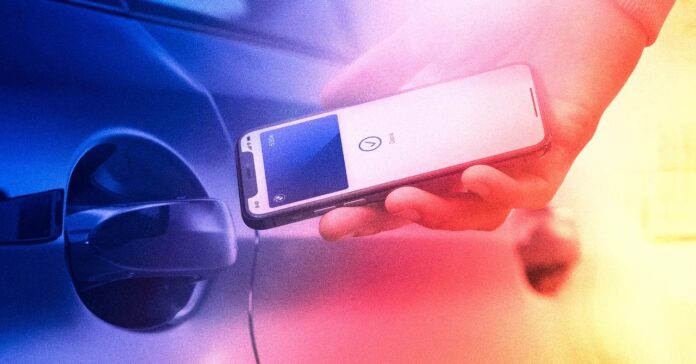My iPhone Wallet holds my transit passes, theater tickets, all my payment cards, and even lets me breeze through my gym’s turnstile with a tap. It uses Bluetooth seamlessly, requiring only proximity or a quick glance towards my face to unlock its functions. Security is solid thanks to biometric authentication, and I don’t need to fumble around for physical access cards.
So why, then, do I still pull out a bulky metal key when entering my electric vehicle?
It’s more than just a regular old key; it’s a sophisticated electronic fob that unlocks the car with radio signals – no button pressing required. Yet, it’s still a germy plastic square, easily misplaced, and sporting a brand logo I no longer need to advertise. Honestly, I haven’t needed it for years.
The future of keyless entry isn’t theoretical; it’s here. BMW owners have been using their smartphones as car keys since 2021 through Apple’s Car Key feature (joined later by Audi, Kia, and Hyundai), while Tesla went entirely fob-free with the Model 3 launch in 2017. Newer digital natives like Rivian and Polestar followed suit. Even Ford, known for its traditional approach, is dipping its toes into the digital pool, though they just released a $200 Western-themed buckle to hold onto your bulky fob should you desire an analog experience.
Digital Key Accessibility: Beyond Luxury Cars
It’s not just about premium brands anymore. The aftermarket has caught up. The MoboKey device can turn any smartphone into a digital key, and devices from KeyDIY mimic the rolling codes used by traditional fobs to prevent signal theft.
Despite this clear progress in digital technology, most drivers haven’t ditched their physical keys. Why?
“Most people are reluctant to go without the physical backup of an actual key,” explains Sean Tucker, managing editor of Kelley Blue Book.
This is coupled with ingrained habits and even emotional attachments. Stefan Gössling, a professor at Linnaeus University in Sweden, author of The Psychology of the Car, puts it this way:
“A car key is full of meaning … Jingling them gives some motorists the opportunity to show off their automobile, even if the car is not close by. Car keys are also comforting to some, a physical reminder that your vehicle is there to take you away; to protect you.”
Digital Keys: The Case for Change
For many, the benefits of digital keys outweigh the sentimental attachments:
- Sharing: Easily share access with trusted individuals (think teenagers borrowing a car) without physically handing over a key.
- Convenience: Forget about misplacing bulky fobs or fumbling in your pocket during cold weather. Control everything from your phone, including scheduling climate control.
“You can perform many actions (such as scheduling air conditioning) with configurable button presses on a key fob, but who’s got the mental bandwidth to memorize those sequences?” asks one expert. “It’s so much easier to do it with a smartphone.”
* Cost-effectiveness: Digital keys eliminate the hassle and expense of replacing lost or damaged fobs (a BMW i8 replacement can cost up to $650!). Plus, many smartphones offer digital key functionality for extended periods even when running low on battery.
A Universal Standard?
The roadblocks to widespread adoption are not entirely technological. Carmakers haven’t settled on a single, universally compatible standard for digital keys, hindering interoperability and ease of use across different vehicle brands and smartphone platforms. The Car Connectivity Consortium (CCC) aims to solve this problem. Their Digital Key Certification aims to ensure users can securely access vehicles, manage digital keys, share them with others, and start their engines—all while adhering to rigorous security standards that prevent attacks and unauthorized access.
The CCC has already gained traction with support from major players like Apple, Google, Samsung, Ford, GM, BMW, Honda, and even several Chinese car manufacturers.
“Interoperability is what makes it possible to easily share a digital key with friends or family,” explains Alysia Johnson, president of the CCC.
The future likely won’t be entirely fob-free. Some drivers will cling to the physical sensation of metal keys for their psychological comfort and status symbol appeal, but for most others, the convenience, security, and shared access benefits of digital keys make them a compelling alternative to outdated technology.





















































